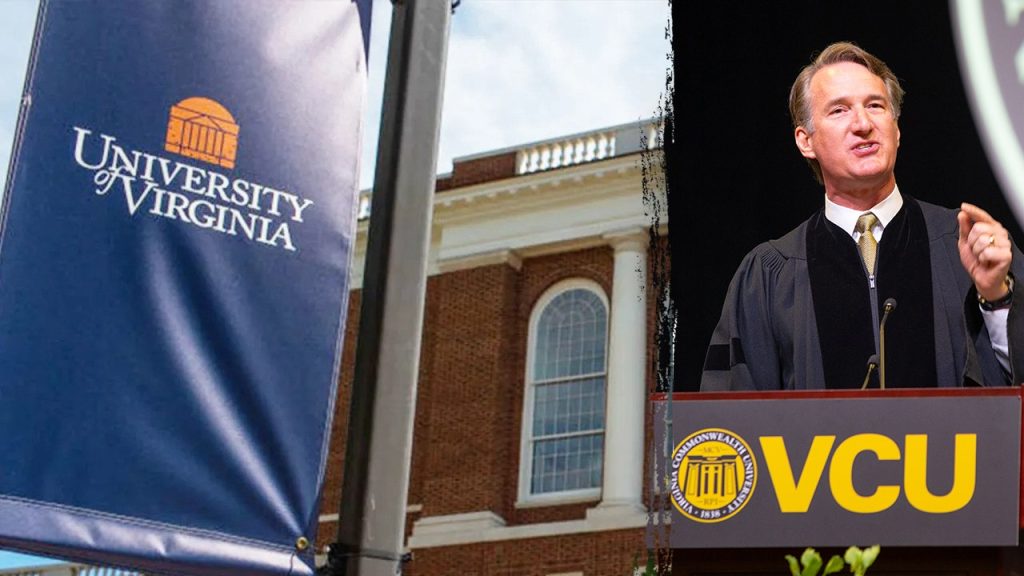Virginia Republicans Decry Democratic Blockade of Governor Youngkin’s University Board Appointments
Political Tensions Rise Over University Leadership in Virginia
A growing political standoff in Virginia has reached new heights as Democratic state senators blocked 14 more of Republican Governor Glenn Youngkin’s university board appointments last week. This latest action brings the total number of blocked gubernatorial appointees to 22 since June, creating what Republicans describe as an unprecedented partisan blockade affecting the state’s higher education institutions. The dispute centers around appointments to boards at the University of Virginia, Virginia Military Institute, and George Mason University, with Governor Youngkin claiming that Democrats are causing “irreparable harm” to higher education in the state. The governor has expressed frustration that Democrats provided no explanation for their actions and has questioned the legal authority of a single Senate committee to remove his appointees rather than requiring approval from the full General Assembly.
Legal Questions and Court Involvement Intensify the Conflict
The blockade was initiated by the Democrat-led Senate Committee on Privileges and Elections, chaired by Senator Aaron Rouse. While a circuit court judge initially sided with Democrats, allowing the committee to temporarily block the appointees, Republicans have appealed the matter to the Virginia Supreme Court, where a ruling is pending. This legal dispute highlights the constitutional questions at stake: can a single committee remove gubernatorial appointees, or does state law require the full legislative body to approve such removals? Senator Bill DeSteph criticized Democrats for proceeding with the blockade while the matter is before the Supreme Court, suggesting they were either trying to influence the court or usurp its authority. The timing is particularly significant as Virginia approaches gubernatorial elections, with political stakes running high for both parties.
Democrats Defend Actions as Quality Control, Not Partisan Politics
Democratic leaders in Virginia have acknowledged that their level of rejection is “unprecedented” but deny any partisan motivation. In a letter to Governor Youngkin, they cited “genuine concerns about the qualifications, backgrounds, and intentions” of his appointees. Democrats have suggested that the governor’s choices reflect “inappropriate nominations and acquiescence to outside political influence,” creating instability in the higher education system. They’ve called for Youngkin to suspend further appointments until they can confer with him on the matter. While specific reasons for rejecting individual appointees haven’t been widely publicized, Democrats have signaled they believe some nominees hold views that are too extreme. The conflict appears to reflect deeper disagreements about the direction of higher education in Virginia, particularly regarding diversity initiatives.
DEI Policies at Center of Broader Educational Dispute
The appointment blockade comes amid heightened scrutiny of diversity, equity, and inclusion (DEI) programs at Virginia universities under the Trump administration. Just last month, George Mason University’s board voted to retain and give a raise to President Gregory Washington, who has defended the university’s DEI policies against federal directives. Both George Mason University and the University of Virginia face federal civil rights investigations related to alleged racial hiring practices and DEI initiatives. This suggests the board appointment dispute may be part of a larger ideological battle over university governance and policies. Republicans contend that Democrats are blocking qualified individuals who might align with the governor’s educational priorities, while Democrats maintain they’re protecting educational institutions from appointees they view as potentially harmful to established university values.
Practical Consequences for University Operations
The Democratic blockade has already created operational difficulties for at least one institution. At George Mason University, the Board of Visitors now lacks enough members to constitute a quorum required to conduct official business, according to the Washington Post. This governance vacuum comes at a particularly challenging time, as the university navigates federal investigations and responds to directives regarding its diversity programs. Republicans argue that such disruptions demonstrate how the political dispute is harming the institutions themselves. State Senator Glen Sturtevant noted that blocked appointees include distinguished individuals such as a former Mastercard president who had served under both Republican and Democratic governors and the former president of the Northern Virginia Technology Council, suggesting the state is losing access to valuable expertise and leadership.
Concerns About Long-term Impact on Public Service
Beyond the immediate political and operational concerns, Virginia Republicans worry that the precedent being set could discourage qualified individuals from pursuing public service roles in the future. State Senator Tara Durant questioned during last week’s meeting: “What will happen in the future to dissuade those who are willing to serve the Commonwealth in this capacity?” This highlights a broader concern about the potential chilling effect on civic engagement when appointments become entangled in partisan disputes. As the Virginia Supreme Court considers the legal questions at stake and the gubernatorial election approaches, both parties appear entrenched in their positions, with Republicans defending the governor’s appointment authority and Democrats insisting on their oversight role. Meanwhile, Virginia’s universities find themselves caught in the middle of a political struggle that could shape higher education governance in the state for years to come.


